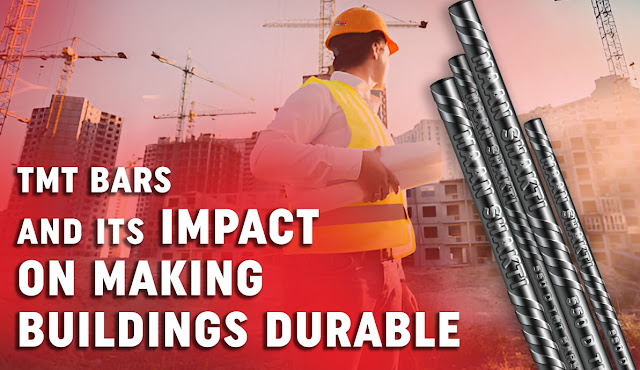Ins and Outs to Know about Corrosion Resistance TMT Bars
Simply put, TMT bars are made of steel as a
core ingredient. However, their corrosion-resistant nature prevents them from rusting due to moisture and other external factors. Now, how does rusting occur, and what makes TMT bars the safest consideration in construction? So, before you find the best manufacturer of TMT Saria Assam, let’s find this out in detail.
An Overview of Corrosion Resistance TMT Bars
The construction world defines corrosion as the deterioration of metals that result from environmental reactions and impacts of one metal on the other. Steel bars can corrode over time with iron oxidising in exposure to oxygen. Corrosion isn’t just an aesthetic issue that damages the overall appeal of a structure. It goes beyond the aesthetics, impacting the pipelines and the buildings.
From damaging aesthetics to affecting the structural integrity of the house, dams, bridges, and other construction structures, it can bring significant consequences like sudden structural collapse or internal cracks. Corrosion reacts mainly in exposure to acid, moisture, and other environmental factors.
Thankfully, the manufacturers of TMT bars have now made it possible to produce TMT bars rust-free. TMT bars undergo a mechanical treatment during the production phase. Due to this process, these bars are of premium quality and ensure corrosion resistance.
So, suppose you are in the market in search of top-quality thermo-mechanically treated bars. In that case, this post explains how and why corrosion-resistant TMT bars have become the new constant in this construction universe.
What Makes TMT Bars Corrosion Resistant?
As described above, TMT bars undergo a mechanical treatment. This process involves quenching, self-tempering, and annealing, which makes TMT bars corrosion-resistant. After the bars get out of the mill stand, they are cooled by water jets during the quenching process.
This process results in the creation of a hard outer coating, which is known as martensite. This coating possesses corrosion-resistant qualities. The bars are further coated with zinc coating to build more corrosion resistance with high moisture content.
Chromium and nickel content in the bars make them corrosion-resistant. The following are the reasons that make these bars rust-resistant:
Micro-Alloying Elements
TMT bars are prone to corrosion as iron oxidises with oxygen. However, these bars undergo a special manufacturing process where micro-alloying elements are added to steel during manufacturing, like boron, vanadium, niobium, titanium, zirconium, molybdenum, cerium, and lanthanum.
These micro-alloying elements improve the cooling process of the bar and help achieve malleable and bendable properties. Furthermore, they also refine and detoxify grains, thereby controlling the grain size and further improving durability. Rare-earth metals like Lanthanum and Cerium purify the steel by removing the impurities.
Raw Materials Used
TMT bars are corrosion-resistant because they contain premium quality raw materials such as iron ore, dolomite, limestone, coke, coal, etc. A reliable manufacturer tests the raw materials many times before selecting them.
Ductility and Endurance
Most corrosion-resistant steel bars are ductile because they have the ability to bend as per the requirements of the structure. Besides, they are highly resistant to adverse conditions such as acidic substances, groundwater salinity, and more.
Longevity and Strong
Corrosion-resistant bars have longevity and are technologically superior. Note that corrosion doesn’t affect the grip on the concrete, so they are strong. Moreover, these bars are easily bendable and flexible, so they can resist the additional pressure and load imposed on the construction structure. Most steel plants implement sought-after technologies to ensure the bars are corrosion-resistant.
Top Tests for Ensuring TMT Bars are Corrosion Resistance
If you want to ensure the TMT bars’ corrosion resistance, you can conduct different tests to ensure the bars meet the industry standards. A few corrosion resistance tests include the following:
Fog Testing or Salt Spray
In this test, around 5% of the NaCl solution gets atomised in the chamber where the temperature is adjusted to 35°C. Note down the time for which the bar stands against corrosion as it measures the durability of the bar.
Atmosphere Exposure
This test is regarded as the weathering test. Here, the durability of the steel bar is examined. For this, you need to expose the bar to ultraviolet light and cyclic cooling/heating.
Immersion Testing
It’s a standard corrosion test where the dried test specimens’ weights are measured before and after exposure to the corrosive atmosphere for a specific timeframe. Upon this, the process then eliminates the corrosion-forming material or organic contaminants. The bars’ corrosion resistance quality is measured considering the thickness loss (in mils, where 0.001 inches) for each year (i.e., mpy) or millimetres per year (or mm/yr).
Besides, other standard tests help you measure the corrosion resistance of steel, and they are the potentiodynamic test and the sulphur di Oxide test.




Great post! Keep up the excellent work! Check High quality Tmt bars.
ReplyDelete